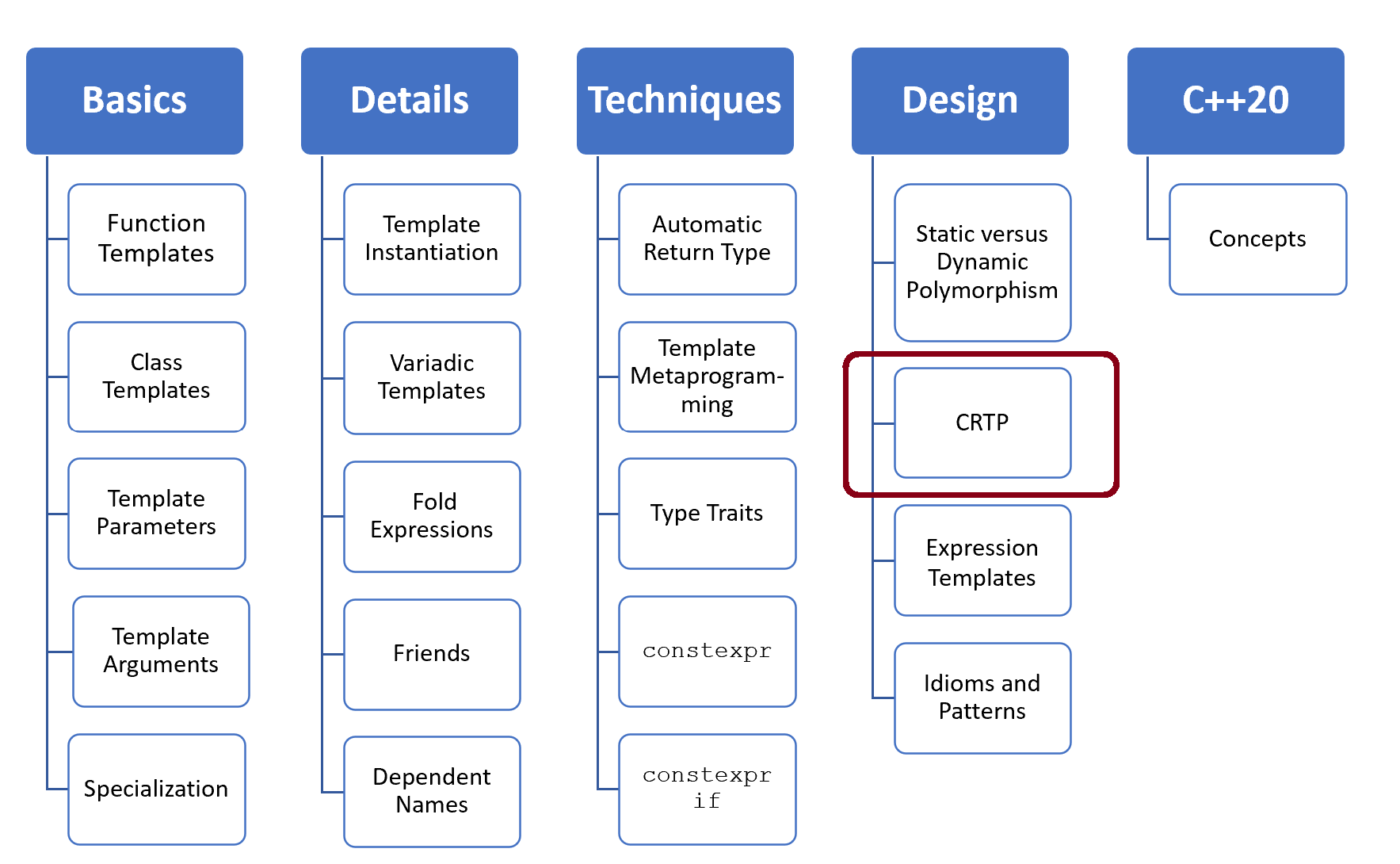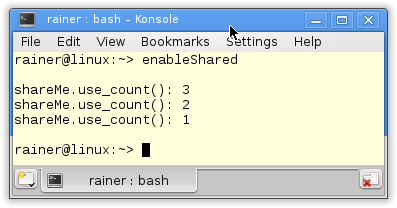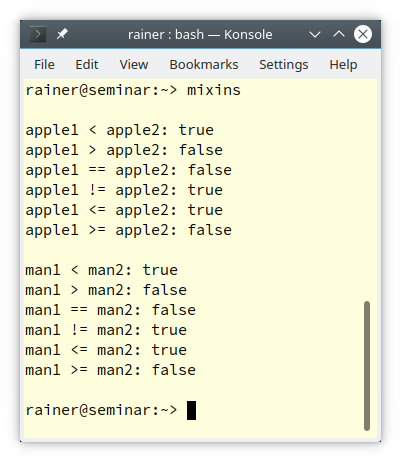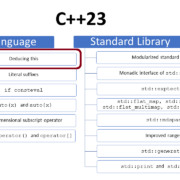Mixins
In my previous post “More about Dynamic and Static Polymorphism”, I used the Curiously Recurring Template Pattern (CRTP) to implement static polymorphism. Another typical use case for CRTP is mixins.

Mixins are a popular idea in the design of classes to mix in new code. Therefore, it’s an often-used technique in Python to change the behavior of a class by using multiple inheritances. Contrary to C++, it is legal in Python to have more than one method definition in a class hierarchy. Python uses that method that is first in the Method Resolution Order (MRO).
You can implement mixins in C++ by using CRTP. A prominent example is the class std::enable_shared_from_this.
std::enable_shared_from_this
Let’s see std::enable_shared_from this and, therefore, CRTP applied.
// enableShared.cpp #include <iostream> #include <memory> class ShareMe: public std::enable_shared_from_this<ShareMe> { // (1) public: std::shared_ptr<ShareMe> getShared(){ return shared_from_this(); // (2) } }; int main(){ std::cout << '\n'; std::shared_ptr<ShareMe> shareMe(new ShareMe); std::shared_ptr<ShareMe> shareMe1= shareMe->getShared(); // (3) { auto shareMe2(shareMe1); std::cout << "shareMe.use_count(): " << shareMe.use_count() << '\n'; } std::cout << "shareMe.use_count(): " << shareMe.use_count() << '\n'; shareMe1.reset(); std::cout << "shareMe.use_count(): " << shareMe.use_count() << '\n'; std::cout << '\n'; }
By using the class, std::enable_shared_from_this you can create objects that return a std::shared_ptr to itself. You must derive your class public from (line 1) to get it. Now, your class MySharedClass has a member function shared_from_this (line 2) for creating std::shared_ptr to its objects. The call shareMe->getShared() (line 3) creates a new smart pointer. The member function getShared internally uses the function shared_from_this (line 2). The following screenshot shows the creation of the shared pointer.

 Modernes C++ Mentoring
Modernes C++ Mentoring
Do you want to stay informed: Subscribe.
To learn more about smart pointers, read my previous posts: smart pointers.
How do mixin classes work in C++? Let me introduce a typical use case.
Extending a Class with all Relational Operators
Imagine you want to implement all six comparison operators for your data type. (Of course, with C++20, the compiler can auto-generate them: C++20: The Three-Way Comparison Operator). So far, you have only implemented the smaller operator (<). You know that you can derive all other five comparison operators (<=, >, >=, == , and !=) from the smaller operator. Applying this idea and using CRTP save you many keyboard strokes.
// mixins.cpp #include <iostream> #include <string> template <typename Derived> struct Relational { friend bool operator > (Derived const& op1, Derived const& op2){ return op2 < op1; } friend bool operator == (Derived const& op1, Derived const& op2){ return !(op1 < op2) && !(op2 < op1); } friend bool operator != (Derived const& op1, Derived const& op2){ return (op1 < op2) || (op2 < op1); } friend bool operator <= (Derived const& op1, Derived const& op2){ return (op1 < op2) || (op1 == op2); } friend bool operator >= (Derived const& op1, Derived const& op2){ return (op1 > op2) || (op1 == op2); } }; class Apple: public Relational<Apple>{ public: explicit Apple(int s): size{s}{}; friend bool operator < (Apple const& a1, Apple const& a2){ // (1) return a1.size < a2.size; } private: int size; }; class Man: public Relational<Man>{ // (3) public: explicit Man(const std::string& n): name{n}{} friend bool operator < (Man const& m1, Man const& m2){ // (2) return m1.name < m2.name; } private: std::string name; }; int main(){ std::cout << std::boolalpha << '\n'; Apple apple1{5}; Apple apple2{10}; std::cout << "apple1 < apple2: " << (apple1 < apple2) << '\n'; std::cout << "apple1 > apple2: " << (apple1 > apple2) << '\n'; std::cout << "apple1 == apple2: " << (apple1 == apple2) << '\n'; std::cout << "apple1 != apple2: " << (apple1 != apple2) << '\n'; std::cout << "apple1 <= apple2: " << (apple1 <= apple2) << '\n'; std::cout << "apple1 >= apple2: " << (apple1 >= apple2) << '\n'; std::cout << '\n'; Man man1{"grimm"}; Man man2{"jaud"}; std::cout << "man1 < man2: " << (man1 < man2) << '\n'; std::cout << "man1 > man2: " << (man1 > man2) << '\n'; std::cout << "man1 == man2: " << (man1 == man2) << '\n'; std::cout << "man1 != man2: " << (man1 != man2) << '\n'; std::cout << "man1 <= man2: " << (man1 <= man2) << '\n'; std::cout << "man1 >= man2: " << (man1 >= man2) << '\n'; std::cout << '\n'; }
I’ve for Apple and Man implemented the smaller operator (lines 1 and 2). For simplicity, I only use the class Man in my argumentation. Man is public derived from the class Relational<Man> (line 3) using CRTP. The class Relational supports the five missing relational operators (<=, <,>=, ==, and !=). The five relations operators are mapped onto the less operator of Man (line 2).

Honestly, I like the name mixins for this idiom. The class Relational mixes the remaining relational operators into the class Man.
The characteristic of CRTP is that a class Derived derives from a class template Base and Base has Derived as a template argument:
class Derived : public Base<Derived> // (1) { ... }; class Derivedwrong : public Base<Derived> // (2) { ... };
How can you ensure that you are not erroneously derived the wrong class DervivedWrong from Base<Derived> such as in line 2?
Checked CRTP
The trick is straightforward: make the constructor of Base private.
// crtpCheck.cpp #include <iostream> template <typename Derived> struct Base{ void interface(){ static_cast<Derived*>(this)->implementation(); } private: Base() = default; // (2) friend Derived; // (2) }; struct Derived1: Base<Derived1>{ void implementation(){ std::cout << "Implementation Derived1" << '\n'; } }; struct Derived2: Base<Derived1>{ // (3) void implementation(){ std::cout << "Implementation Derived1" << '\n'; } }; template <typename T> void execute(T& base){ base.interface(); } int main(){ std::cout << '\n'; Derived1 d1; execute(d1); Derived2 d2; execute(d2); std::cout << '\n'; }
Base has a private default constructor (line 1). Only the class Base itself or the friend Derived (line 2) can invoke the default constructor. Consequentially, the call Derived2 d2 (line 3) fails because Derived2 it is derived from Base<Derived1>. Here is the error message from GCC:
What’s next?
The Curiously Recurring Template Pattern (CRTP) is not easy to understand but very powerful. The same holds for expression templates. Expression templates allow you to get rid of superfluous temporaries.
Thanks a lot to my Patreon Supporters: Matt Braun, Roman Postanciuc, Tobias Zindl, G Prvulovic, Reinhold Dröge, Abernitzke, Frank Grimm, Sakib, Broeserl, António Pina, Sergey Agafyin, Андрей Бурмистров, Jake, GS, Lawton Shoemake, Jozo Leko, John Breland, Venkat Nandam, Jose Francisco, Douglas Tinkham, Kuchlong Kuchlong, Robert Blanch, Truels Wissneth, Mario Luoni, Friedrich Huber, lennonli, Pramod Tikare Muralidhara, Peter Ware, Daniel Hufschläger, Alessandro Pezzato, Bob Perry, Satish Vangipuram, Andi Ireland, Richard Ohnemus, Michael Dunsky, Leo Goodstadt, John Wiederhirn, Yacob Cohen-Arazi, Florian Tischler, Robin Furness, Michael Young, Holger Detering, Bernd Mühlhaus, Stephen Kelley, Kyle Dean, Tusar Palauri, Juan Dent, George Liao, Daniel Ceperley, Jon T Hess, Stephen Totten, Wolfgang Fütterer, Matthias Grün, Ben Atakora, Ann Shatoff, Rob North, Bhavith C Achar, Marco Parri Empoli, Philipp Lenk, Charles-Jianye Chen, Keith Jeffery, Matt Godbolt, Honey Sukesan, bruce_lee_wayne, Silviu Ardelean, schnapper79, Seeker, and Sundareswaran Senthilvel.
Thanks, in particular, to Jon Hess, Lakshman, Christian Wittenhorst, Sherhy Pyton, Dendi Suhubdy, Sudhakar Belagurusamy, Richard Sargeant, Rusty Fleming, John Nebel, Mipko, Alicja Kaminska, Slavko Radman, and David Poole.
| My special thanks to Embarcadero |  |
| My special thanks to PVS-Studio |  |
| My special thanks to Tipi.build |  |
| My special thanks to Take Up Code |  |
| My special thanks to SHAVEDYAKS |  |
Modernes C++ GmbH
Modernes C++ Mentoring (English)
Rainer Grimm
Yalovastraße 20
72108 Rottenburg
Mail: schulung@ModernesCpp.de
Mentoring: www.ModernesCpp.org







Leave a Reply
Want to join the discussion?Feel free to contribute!